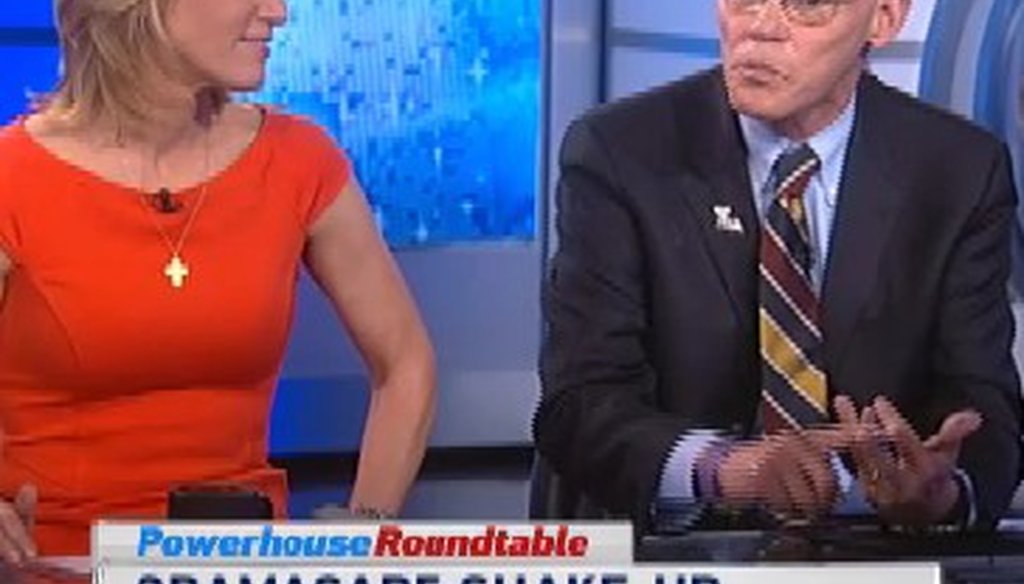Stand up for the facts!
Our only agenda is to publish the truth so you can be an informed participant in democracy.
We need your help.
I would like to contribute

James Carville and Laura Ingraham tussled over the Affordable Care Act on ABC's "This Week."
Need a reason to second-guess what partisan observers are saying about the health care law?
We’ve got seven.
Pundits of all political stripes are guilty lately of misjudging the health care law. Some are eager to call it a success or failure based on limited preliminary information, and others insist on using slanted talking points to misrepresent information from independent sources.
1. Obamacare enrollment total is inflated by plans left in ‘online shopping carts.’
The rating: False.
Sign up for PolitiFact texts
President Barack Obama says the number of people who signed up for health care on federal and state exchanges exceeds 8 million. Conservative billionaire and politics-dabbler Donald Trump called that a lie, tweeting, "Obama counts an enrollee as a web user putting a plan in ‘their online shopping carts’."
Obamacare is not Amazon, and registering for health insurance is not as easy as buying a leaf blower in a single click. For a person to be counted as enrolled in Obamacare, he or she must have submitted an application for health insurance, which is then sent to the government and the private insurer supplying the chosen plan.
Some insurers allow enrollees to pay the first premium immediately online, but many do not, instead billing customers by mail and giving them a month or so to pay up.
Even though it’s likely some enrollees will not make a first payment, Trump’s point betrays the fact that Obamacare registration is a multi-step process and not everyone can pay at checkout.
2.The insurance risk corridors are not going broke like the GOP warned.
The rating: Mostly False.
We feel your eyes glazing over "insurance risk corridors," but listen up. This is a touchy subject to some Republicans who say the risk corridors are a part of a built-in bailout for health insurance companies.
We entered the fray after Democrat James Carville and conservative radio host Laura Ingraham argued about the law on This Week, with Carville saying, "You said the risk corridors were going to go broke. None of it has happened. Get over it. It’s working."
The concept errs on the side of complicated, but here are the basics. The health care law aims to create a new reality for insurance carriers by making them cover both the healthy and the sick -- an untested strategy that creates uncertainty in how much insurers should charge everyone, especially in the early years. So the law creates risk corridors, among other programs, to help spread potential losses and profits among companies and between companies and the government. The corridors cover the first three years of the health care law, 2014-16. (See the fact-check for more detail on how they work.)
The nonpartisan Congressional Budget Office estimated the government will gain about $8 billion from the risk corridors and other risk adjustment programs. While that does not suggest the risk corridors will go broke, it does not support Carville’s claim.
The biggest issue is Carville’s phrasing. Estimates aside, we will not know what will happen with the risk corridors until the end of 2014. He jumped the gun.
3. Obamacare is costing the country 2 million jobs.
The rating: Mostly False
As Carville laid out a case for the law’s success, Ingraham jumped in with a reason for its failure: "It’s costing 2 million jobs," she said, attributing the figure to CBO.
Fact-checkers have heard this one from Obamacare critics many, many times. Simply put, it’s not what CBO said. Its report states: "The reduction in CBO's projections of hours worked represents a decline in the number of full-time-equivalent workers of about 2.0 million in 2017, rising to about 2.5 million in 2024."
Translation: More people will be inclined to work fewer hours as a result of obtaining more affordable health insurance, be it through tax credits for private insurance or expanded Medicaid eligibility. More employees will leave the workforce voluntarily than those who lose their jobs as a result of employers downsizing to comply with the law, CBO found.
4.Health insurance and medical costs "are going down because of Obamacare."
The rating: Mostly False.
Liberal MSNBC host Ed Schultz proclaimed on his show, "Health insurance costs and medical care costs fell sharply in January, ding, ding, ding. For the first time in decades, we finally have this: Health care costs are going down because of Obamacare."
Schultz was referencing numbers from the Personal Consumption Expenditures Price Index from the Bureau of Economic Analysis. There was a decrease for the price of health insurance and health services that month, but experts told us not to pay too much mind to data for a single month because the figures jump around quite a bit.
Plus, other measures for overall health care spending, not prices, show costs continue to slowly rise. In a big challenge to Schultz’s claim, we still do not know the impact of the health care law on keeping the cost of health care in check.
5. Obamacare spends $2 trillion to reduce America’s uninsured by just 3 percent.
The rating: False.
Former U.S. Sen. John E. Sununu, R-N.H., laid out not-so-compelling math to explain why Obamacare is failing in its goal to cover the uninsured.
"It’s not about enrollment figures. It’s about reducing the number of uninsured in this country. We have 50 million uninsured. If you only look at the enrollment figure, you miss the question of how many of them were previously uninsured."
"So you have to multiply it by about 80 percent, Rand says 80 percent probably will be the number that actually pay. Gets you down to 5.6 (million). And how many who were previously uninsured, McKinsey consulting did some surveys, 25 percent previously uninsured. Now you're down to 1.4 million. That’s about 3 percent. Reducing the number of uninsured in America by 3 percent for how much money? $2 trillion. That’s not good cost-spending,"
The fact-check breaks it down piece by piece, but here are three big-picture flaws with the argument.
The components of his math are based on shaky assumptions.
The $2 trillion cost is a 10-year projection that does not factor in revenue from the law.
And the federal- and state-operated health marketplaces are just one place where people will find insurance through the law. The law also seeks to expand insurance offered by employers, where most people already get it, and through Medicaid. Studies show millions of Americans have obtained insurance for the first time through these avenues over the six-month enrollment period that wrapped in March.
6. Liz Cheney: Obamacare fans ‘have been steadily dropping.’
The rating: False.
Know this: Polls over recent years usually find the health care law is unpopular.
But Republican Liz Cheney, a one-time Wyoming Senate candidate and daughter of former Vice President Dick Cheney, erred in trying to take it a step further on Fox News Sunday.
"The numbers of people that support Obamacare and like it have been steadily dropping," she said. "The latest Wall Street Journal polls show that."
We consulted individual polls, including the one she cited, and websites that report averages of various national polls, such as Real Clear Politics and HuffPost Pollster. We found the country remains divided on the law, but we found no evidence of a steady drop of support from Obamacare fans.
7. Charles Krauthammer: Obamacare’s hardship exemption spares anyone from tax penalty.
The rating: Mostly False.
Conservative pundit Charles Krauthammer says people who don’t want to abide by the health law’s individual mandate should just "tick off the box that says ‘hardship’ and you're out."
He is over-simplifying the process for avoiding the tax penalty that comes with not having health insurance.
There’s an application for the hardship exemption that contains 14 categories mostly relating to catastrophic personal and financial events that may reasonably prevent someone from obtaining health insurance. Most require backup documents or a written explanation, so you don’t just check a box when you’re filing your taxes.
The list includes a 14th category that reads kind of like "other," but experts told us it’s meant to catch examples of hardship not spelled out in the application. Documentation is requested if possible.
The moral of the story: Claiming a hardship exemption does not mean you get one.
Our Sources
See individual fact-checks.














































